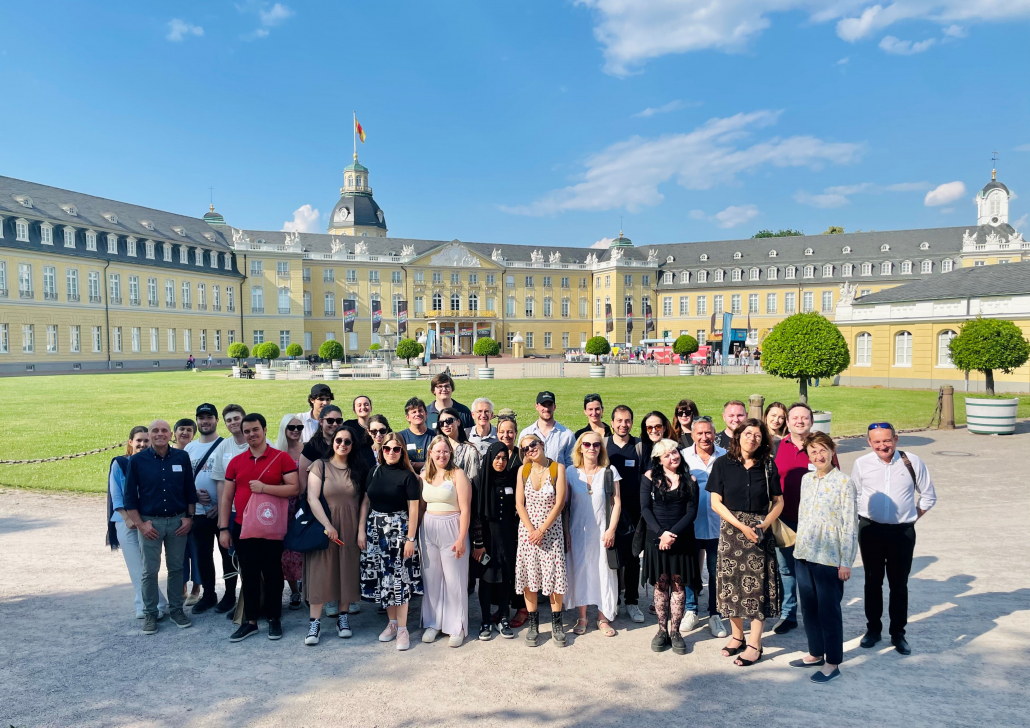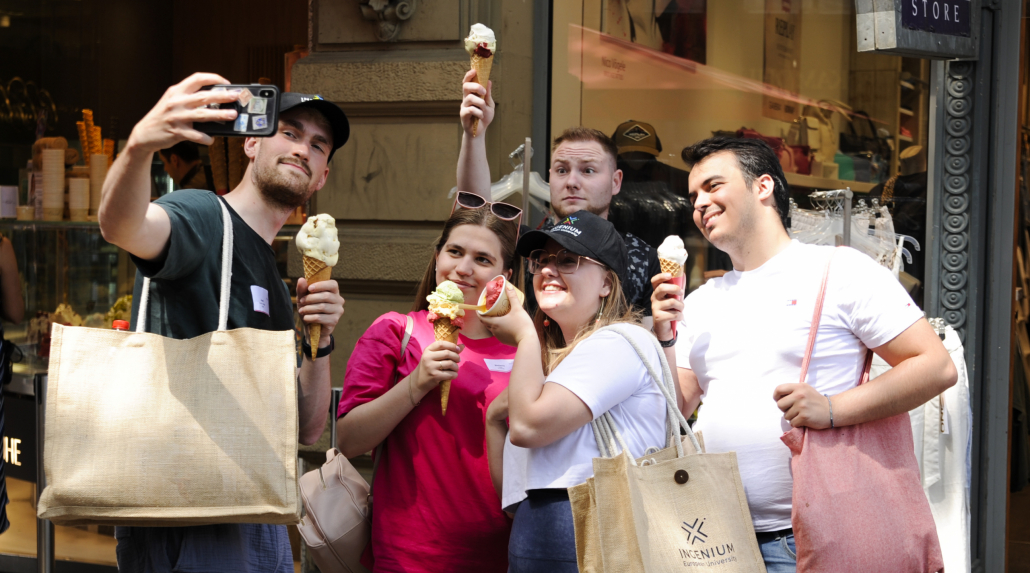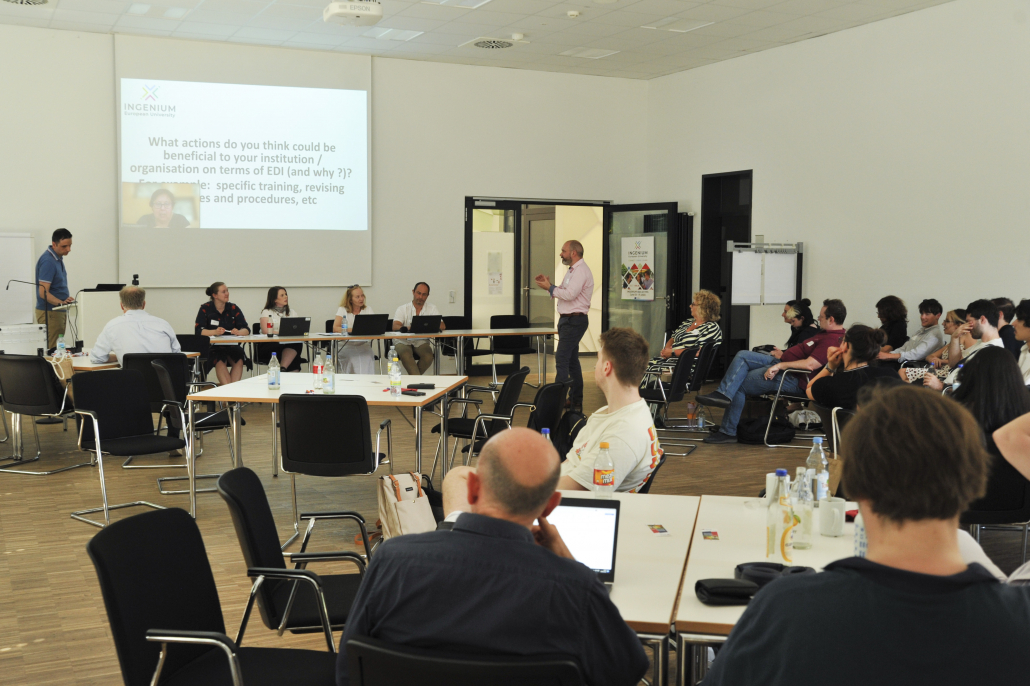Well-being and intercultural bonds: insights from a participant’s experience at INGENIUM’s Junior School
Group photo of participants of INGENIUM Junior School in front of the Karlsruhe Palace
Back in June, Jesús Vera Berdasco embarked on a unique educational journey by participating in the inaugural edition of INGENIUM’s Junior School in Karlsruhe. As the President of the Student Council at the University of Oviedo, Jesús’s decision to join the 10-day program was driven by an interest in fostering intercultural connections.
In this interview, Jesús provides an insider’s perspective on his experiences during the program, shedding light on its structure, impact, and the valuable insights he gained.
Can you please share with us what motivated you to apply for a place in the inaugural edition of the INGENIUM 10 Days program?
As the President of the Student Council at the University of Oviedo, I had been closely following the progress of the INGENIUM alliance for quite some time. When the program for the Junior School in Karlsruhe was announced, I knew right away that I wanted to immerse myself in that experience and share it with others.
Being a student at the University of Oviedo, what steps did you take to secure a place in the Junior School in Karlsruhe?
Unlike the rather complex application processes for programs like Erasmus mobility, the application for the Junior School was relatively straightforward. The requirements were clear: meet the profile criteria and demonstrate proficiency in English at a B2 level. Once the final selection was made, I gladly accepted the offer.
Upon learning that you had been chosen, what were your expectations for what you would gain from this experience?
Given my involvement in the Student Council, my main expectation was to connect with fellow student representatives from the diverse INGENIUM Alliance and learn about the functioning of their respective representation bodies. Additionally, I was eager to explore the educational aspect of the program, which focused on promoting diversity, inclusion, and campus well-being.
Did the reality live up to your expectations?
Yes, although the experience was slightly different from what I had initially anticipated. I had imagined the program to be primarily theoretical, but to my surprise, it turned out to be five days filled with dynamic and practical formats. This approach facilitated my understanding of the key concepts surrounding diversity and campus well-being. The organisers ensured that the information was effectively communicated to us.
Let’s delve into the logistics of the trip. When you found out that you had secured a place, what support did the University of Oviedo provide, and how did you arrange your travel and accommodation in Karlsruhe?
The Karlsruhe University of Applied Sciences, our hosts, arranged our accommodation in a hostel where all the participating students stayed. Therefore, the only aspect I had to worry about was transportation.
As you prepared for the trip, were there any items you wished you had brought to Karlsruhe?
A fan! The weather forecast kept changing every week, and it turned out to be even hotter than expected. Luckily, I had packed appropriate summer clothes.
In terms of materials required for the Junior School, the University informed us that, apart from a mobile phone or electronic device, we wouldn’t need anything else. As it turned out, upon our arrival, we were provided with INGENIUM merchandise, rendering the need for personal notebooks unnecessary.
Can you tell us about your standout experience during the educational and activity program?
The “Europe in Karlsruhe City Rally” activity was truly remarkable. It involved disconnecting from our phones and aimlessly exploring the city for an hour.
The Junior School emphasised the importance of health and well-being on campus, and this activity aimed to highlight how little time we spend each day without devices, simply communicating with others and discovering our surroundings without relying on Google Maps.
During the walk, we got to enjoy an ice cream and explore the stunning Karlsruhe Palace gardens. When we returned, the teachers asked us how we felt, encouraging us to reflect on the experience.
Participants of INGENIUM Summer School explore Karlsruhe during the activity “City rally”
How did you feel after the activity?
I felt much more relaxed.
Did you incorporate digital disconnection into your daily life after this experience?
Yes, after the Junior School ended, I went on an Interrail trip. In several cities, I decided to leave my phone at the hotel and spend an hour aimlessly exploring the streets on my own, without relying on Google Maps. It wasn’t the same as in Karlsruhe because I was alone, and the essence of digital disconnection is being able to share that freedom with others.
Apart from this exercise, which classroom activity stood out for you?
The intercultural role-playing game. We were divided into groups at different tables and had to create gestures for each symbol on the dice. Rolling the dice determined which gesture everyone at the table had to perform simultaneously. If we did it successfully, we received a token, and the person with the most tokens would win.
One interesting aspect was when a new member joined our table, they had different gestures for each symbol. We had to decide whether to teach them our gestures or focus on winning. The game aimed to reflect on how we treat people with different cultures and values and put ourselves in their shoes.
Participants of INGENIUM Summer School during the session “What does diversity mean for you as a university student?”
Can you summarize what you learned at the Junior School in two messages?
From the well-being part: enjoy your surroundings and take time to disconnect digitally every day. From the intercultural part: consider how you want to be treated and how to treat people from different backgrounds.
Did you make any valuable contacts during the program, and do you still keep in touch with them?
I met wonderful people, and what surprised me was that there were no cliques; everyone got along with everyone else. I still stay in touch with at least one person from each university, and I look forward to visiting their cities in the future.
Let’s imagine you’re facing someone who has been chosen to take part in the upcoming edition of the INGENIUM Summer School. What guidance would you offer them to fully capitalize on this remarkable experience?
I would strongly advise them to quickly establish connections with fellow students coming from diverse nations right from the outset. If an official WhatsApp group doesn’t exist, take the initiative to create one. Challenge yourself to engage in conversations with individuals from various backgrounds and effortlessly break the ice. Remember, the relationships you build during this time will ultimately be the most invaluable lessons you’ll walk away with.




